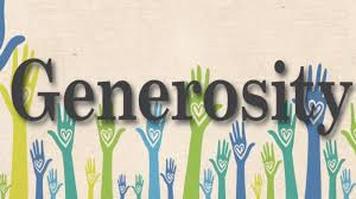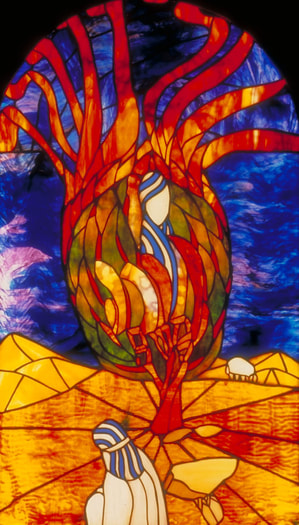
Exodus 16:2-15, Matthew 20:1-16
Do you remember this old saying:” a conservative is a liberal who has been mugged, and a liberal is a conservative who has been arrested?” Of course, we know there is more to it than that! But it makes us think: What makes us so hardened in our points of view? Also, what helps us to change? What opens us up to respond to life the way Jesus did? What makes us transcend our labels so we become simply children of God?
Look at health care, for instance, which is being debated vigorously again in Congress this past week. One strong group wanted to gut and replace the Affordable Care Act. They are slowly bleeding it dry. On the other side of the aisle, there are representatives just as dedicated to put the kibosh on these plans -- some are even calling for a single payer plan. Opinions are hardened. The atmosphere is tense and ugly. What does it take to change an entrenched perspective? Seeing sick loved ones without care? Believing taxes are too high? What makes us change? How do we simple become, children of God?
The bible is a book about change. Forget the labels of conservative and liberal, Republican and Democrat. As followers of Jesus Christ we are called to embrace the injustices and hurts of the world, to call forth the kingdom of heaven on earth. Jesus, through the Bible, calls us to be change agents in the world. Beyond all the labels we can think of, we are called to think, act and be children of God.
Last week we explored one pillar of our faith – the power of forgiveness. Today’s lessons give us different insights into the economic principals of the kingdom of God – another necessary pillar in our belief as molded by Jesus. This necessary pillar to transform ourselves into children of God is through generosity.
To understand our lesson from Matthew 18 about the generous landowner, we should take a few steps back to Matthew 19. There, a rich man who has kept the law flawlessly asks Jesus, “what good deed must I do to have eternal life?” Jesus who looks at him with compassion, says “you lack one thing. Go sell what you have and give to the poor and follow me.” The rich man walks away grieving, because he is too attached to his possessions. Jesus remarks that “it is easier for a camel to go through the eye of a needle than for someone who is rich to enter the kingdom of God.” Jesus concludes, “the first shall be last and the last shall be first.” So, we see that what we do with our resources, personal and corporate, makes a difference. Generosity transforms us to true children of God.
This passage segways into our story today. Jesus states that the kingdom of heaven is like a wealthy landowner goes to the town square at 6am to hire workers for his vineyard. He agrees with them the standard daily wage, a denarii. Then the landowner does something unusual. He goes out again at 9am, at noon, at 3pm and the at 5pm and hires whoever is without work and standing idly around.
The landowner is diligent about hiring laborers. His desire is to give work to as many of the unemployed as possible. He knows the lack of consistent work translates into the inability to feed your family and care for your loved ones adequately. The landowner cares for workers at least as much as he cares for his vineyard.
So, at the end of the day, he calls the last first. In sight of everyone the landowner pays those who worked an hour the entire day’s wage of a denarii. We can imagine those who started at 6am, and 9am, and the rest. They’re rubbing their hands in anticipation of a hefty wage in contrast to the workers who were only there an hour. Maybe 2 denarii or perhaps even 3 or 4 denarii, that sounds fair. The excess is already being spent in their minds -- perhaps clear up the tab at the pub, a new pair of sandals, treats for the kids.
So, imagine their outrage when the landowner gives them one denarii as well. Yes, that is what they agreed to. But they worked 12 hours, 9 hours, 6 hours- how is that fair next to someone who only worked 1 hour? And so, they protest. But the Landowner isn’t hearing it. Take your money and go, he says. Or are you envious that I am generous? The workers are stuck in their way of thinking. What’s fair and not fair. But, that’s not what generosity says. The Landowner tries to get them to shift their perspective to what it means to be generous with others.
That is the key to the parable. Jesus has no quarrel with the wealthy landowner or wealth in general. It’s what the landowner does with his abundant resources that make a difference. The landowner knows the workers need at least a denarii as a day’s wage to care for his family. He takes the time and goes to the village square five times in the course of the day to pursue those in need of employment. He gives them all a fair, living wage irrespective of when they started. Unlike the rich man stuck with rules but couldn’t share wealth to the poor, this wealthy landowner sees as his duty to find as many workers as possible and treat them fairly. Now the text doesn’t ask us to follow these labor practices literally. What it does is invite us to engage in a conversation about generosity as a foundational spiritual practice God calls us to.
This is how God acts with us. We are all given grace, irregardless of when we became followers: whether we are children or senior citizens. Further, we are called to emulate the landowner, and to share our resources abundantly. Right now, we are faced with so many who need our help, the victims of Hurricane Harvey, Irma, Maria -- Mexico hit by two earthquakes in a month, all the displaced people in the world, the Rohingya Muslim refugees from Myanmar, the undocumented young adults, the DREAMers who face deportation, and all the people we each know who have problems, illnesses, conflicts, unemployment in their lives. The list can be endless. It may bring on compassion fatigue and we are tempted to bury our heads in the sand. We must cling to Paul’s encouragement when he writes in Galatians 6:9 “We must not grow weary in doing good.”
Compare this to our Hebrew passage from Exodus. The people of Israel are now a displaced people. God has led them out into the wilderness, a barren land that is unable to sustain them. Their lives are turned upside down. Everything around them is unfamiliar and looks dangerous. So, they begin to have second doubts. Their minds are hardened. Even slavery in Egypt looks better than this endless wandering with no guarantee of food. They cry out “would God have killed them in Egypt, where they had bread” instead of leading them out in nowhere land to die of hunger. The text mentions that they complain at least eight times. God, however, remains a calm presence in the midst of the endless complaints.
God could have found some way to shut them up. Or sent them back. After leading them out of a 400-year history of slavery God, instead of giving in on this difficult people, God addresses their needs. God sends bread from heaven, manna, to the Israelites in the morning. In the evening God sends quail for the Israelites to eat. God does this every day for the forty years that the Israelites sojourn. He sends just enough for one day, in order that the people can learn to trust, not the slave-master, but God. In this enormous time of transition, God’s grace is sufficient. Despite the people’s lack of faith and being stuck in the past, God gives generously. Giving generously over decades forges these Israelites into the people of God.
Giving generously is the action of a God-filled heart, led by the Spirit, inspired by Jesus. We give despite the grumblings of the vineyard workers, we give generously despite the constant complaints of the people of Israel in transition. We live in a wilderness time where our church, our nation, our world, our ecosystems, are in the center of change. We live in an anxious frightening time. Will we get hit by a hurricane or earthquake? Will we have the resources to retire? To get our children through college? To pay the mortgage or rent? Will we encounter a terrorist on the train or an unstable person yielding a gun? We are surrounded by so many whatifs. We have turned our vision of a “Promised Land” into a wilderness for the majority of the people. No wonder there are so many complaints. No wonder we are stuck in our way of thinking.
Our texts today acknowledge a people whose lives have turned upside down in the wilderness, a vineyard whose values run counter to that of the world. And we are called to give generously in the wilderness, to give generously in the vineyard. The root of generous from the Latin means “to come from noble birth.” As children of God we indeed come from a noble birth. Let us not forget this, and let us live up to our spiritual heritage.
In this regard we are all called to be liberal-minded, for that is what generosity does. Liberal in the meaning that does not refer to politics. It is an attitude that takes the liberal view, the copious view, the abundant approach. It doesn’t seek the minimal level in giving. It strives for the maximum and then some. Since we have a generous God, we are beckoned to be a generous people of God. So, this calls us to give as much as we can when there are pleas for help, in Houston, in Puerto Rico, in Mexico City, Syria and famine-ravished parts of Africa, to the homeless person who begs on the subway or street corner. We give of our time to go to meetings, to tutor a child, to visit someone in the hospital or prison. We come to church not just when it fits in our schedule easily, and not only for our own spiritual edification, but to lift the spirits of others. We make a habit to bring food, to respond to the needs of the vulnerable of our community. We stretch and train the muscles of giving to make it a daily habit. We give generously, because God, life gives generously to us. So noble people, live to give generously, as our God-given birthright calls us to- the people of God. amen.
http://day1.org/6106-a_wilderness_people_in_the_promised_land


 RSS Feed
RSS Feed